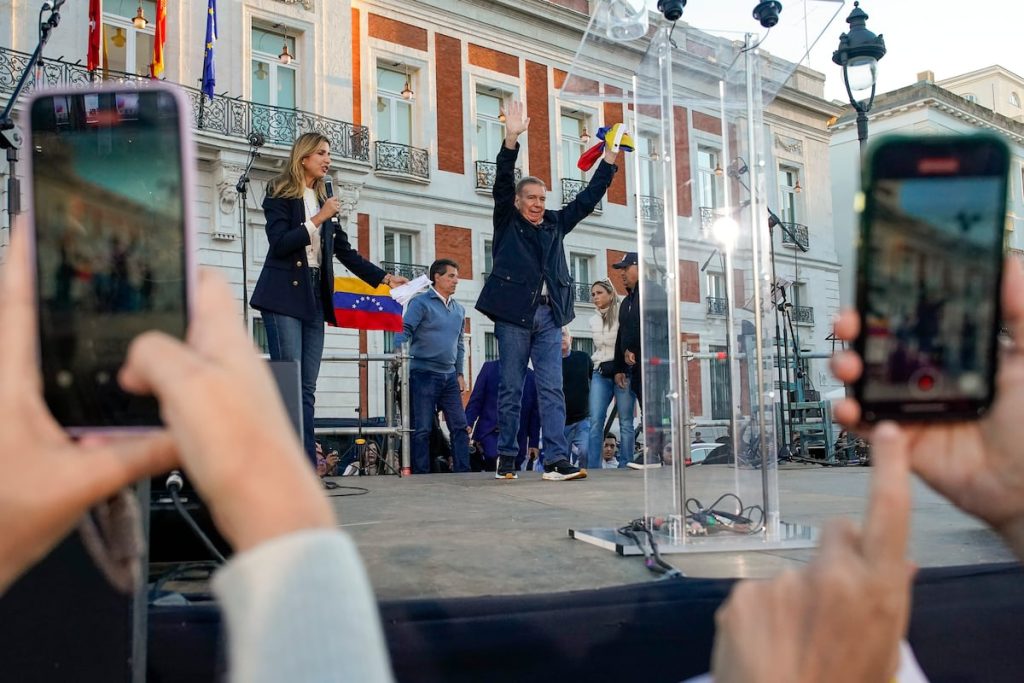The first public appearance of Venezuelan opposition member Edmundo González after seeking asylum in Spain lasted only about 30 seconds, during which he did not speak. On Saturday, in front of around 5,000 Venezuelans gathered at Madrid’s Puerta del Sol, González, who ran as an anti-Chavista candidate in Venezuela’s presidential elections on July 28th, took the stage, greeted the attendees with raised arms, displayed a Venezuelan flag, and then left without saying a word. The protest in Madrid was one of many held around the world by the opposition to Nicolás Maduro’s government, as they contest the election results claimed by the current administration and demand transparency in the electoral process. Many in the international community have expressed doubts about the election results and called for the release of the vote tallies.
Prior to González’s appearance at 7:30 pm, the Puerta del Sol progressively filled with Venezuelan citizens who came out to support the candidate they deemed the rightful winner of the elections and, therefore, the legitimate president of their country. Among the attendees were individuals who had personally experienced political repression, such as Fabiana Mejías, a 26-year-old who was unlawfully detained for 24 hours by Venezuelan authorities in 2017 and later fled to Spain, where she now works in elderly care and the mobile telecommunications sector. Mejías attended the rally to support both González and to call for the release of Biagio Pilieri, a political figure close to opposition leader Maria Corina Machado, and his son Jesús Pilieri, who have been held captive for a month.
Those present at the demonstration on Saturday were predominantly Venezuelan expatriates over 40 years old who have been living in Spain for the past decade. Ángelo Paduano, 61, who arrived in Madrid with his children in 2007 after being dismissed from his job in Venezuela due to his participation in a strike against the Chávez government, reflected on the growth of the Venezuelan community in Spain over the years. While he expressed a desire to return to Venezuela in the event of a political transition, he acknowledged that his children, now adults, have built their lives in Spain. Prominent Spanish political figures, including Alberto Núñez Feijóo and Isabel Díaz Ayuso of the Popular Party, attended the protest to show their support for the Venezuelan opposition cause.
González’s brief appearance left many of his supporters in the crowd wanting more, including Jocelyn, a 43-year-old Venezuelan who arrived in Spain in 2018 to escape persecution by the Venezuelan government. She has worked in domestic service as a live-in caregiver since her arrival, like many other Latin American women in similar circumstances. Jocelyn and her partner Alejandro traveled to Venezuela after the July elections to visit her family, hoping that a political transition would allow her to visit them more frequently. In Barcelona, over 500 people gathered in another protest against the Maduro government, while Venezuelans in the Basque Country also held demonstrations demanding transparency in Venezuela and advocating for González as the rightful president.
The protests held in Spain and around the world reflect the ongoing political and social turmoil in Venezuela, as opposition groups continue to resist the government and demand democratic reforms. The international community’s support for opposition figures like González highlights the global concern for human rights violations and electoral transparency in Venezuela. As the crisis in Venezuela persists, events like these serve as a reminder of the challenges faced by Venezuelans both at home and abroad, and the importance of international solidarity in advocating for democratic values and respect for fundamental rights.


